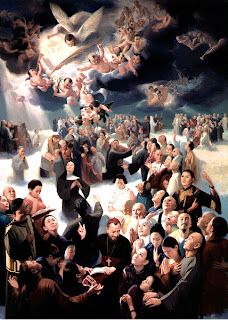"Human device" seems like a term that non-humans use to describe mechanism/tools which are human, or for those who dismiss physical mechanism in spiritual endeavor. I encountered this term when reading up about prayer. When one is absorbed in the daily tasks and work, it can be difficult to keep the presence of God. There are ways to keep ourselves "rooted" of course, such as keeping a crucifix in clear view on our desks.
 Now, for the digital age that made the computer desktop literally our "desk top", there are nifty things like widgets. I personally use Yahoo! Widget Engine (now re-named Konfabulator again, after a very unimaginative name change), and have a Picture Frame widget (prebundled when you install the Widget Engine) that sometimes displays a crucifix.
Now, for the digital age that made the computer desktop literally our "desk top", there are nifty things like widgets. I personally use Yahoo! Widget Engine (now re-named Konfabulator again, after a very unimaginative name change), and have a Picture Frame widget (prebundled when you install the Widget Engine) that sometimes displays a crucifix.
Based on an advice from my SD, I start using a digital equivalent of a click-counter to keep track of the aspirations (short prayers) that one can say (in order to better keep the presence of God) in a day, and found it very nifty indeed! It can be quite revealing however, when at the end of the day, my count remains in the single-digit range!
Very often, the number stared at me and I ran out of aspirations to say. Frankly, there are some days when saying an aspiration is the last thing on my mind. So I thought, why not stand on the shoulders of giants (in our case, the Saints), and mimic their impeccable devotion instead?
 Out of this burst of inspiration, I made my very first widget ever: this widget displays a random aspiration from one of the saints (well, they are mostly from St Alphonsus Liguori, and then there are some from St Teresa de Avila, St Philip Neri, and many others I did not manage to discover). Admittedly, some of their spiritual ejaculations are so POD™ (pious & overly devotional) and almost outside-of-this-world, but they made it, eh? ;) This widget, called "Catholic Random Aspirations", also keeps a counter as to how many you have said today. Clicking on the red button increases the counter and gives you a different random aspiration. Right now it's only a static collection of slightly less than 200 aspirations and can be run OFFLINE.
Out of this burst of inspiration, I made my very first widget ever: this widget displays a random aspiration from one of the saints (well, they are mostly from St Alphonsus Liguori, and then there are some from St Teresa de Avila, St Philip Neri, and many others I did not manage to discover). Admittedly, some of their spiritual ejaculations are so POD™ (pious & overly devotional) and almost outside-of-this-world, but they made it, eh? ;) This widget, called "Catholic Random Aspirations", also keeps a counter as to how many you have said today. Clicking on the red button increases the counter and gives you a different random aspiration. Right now it's only a static collection of slightly less than 200 aspirations and can be run OFFLINE.
Any comment or feedback regarding the use of this widget is very welcome! Also, I'd really appreciate it if you can send me more aspirations. The next version of this widget will draw the aspiration randomly from an online database so that the collection of aspirations can be updated without upgrading the widget itself.
I've submitted this widget for public download at Yahoo! Widgets Gallery and it's still now under review. (I will update this post when it goes live.) In the meanwhile, if you trust that I'm not going to run some malicious code on your machine, you can also download it here (old link removed, updated below). If it helps you keep Him closer, it's enough reward!
UPDATE! The widget is now available for public download at Yahoo! Widgets Gallery. This is the direct link. Enjoy!
